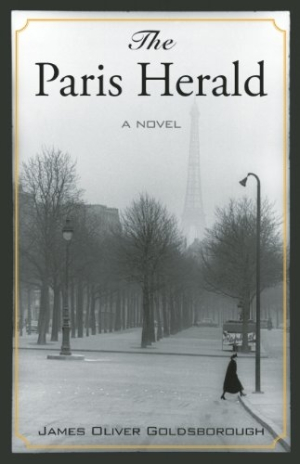The Paris Herald
Goldsborough excels in describing the excessive behavior of his characters and the intoxicating ambiance of Parisian life.
Fictional characters interact seamlessly with actual people and events in James Oliver Goldsborough’s The Paris Herald. The novel chronicles a pivotal time of the esteemed international newspaper and the people who controlled it.
An important link between American and European news and culture since its founding in Paris in 1887, the Paris Herald Tribune evolved with the times and survives under a different name today. In the late 1960s, the newspaper became known as the International Herald Tribune; this book covers that transitional period. Stories about personal lives underscore the larger drama of the newspaper’s financial, technological, and union constraints. Goldsborough worked as a foreign correspondent for the subject newspaper and has written two nonfiction books.
Journalist Rupert Archer’s experiences working at the newspaper anchor the book’s plot. As he meets new colleagues and other people, their stories complement his own. Chapter breaks provide transitions between these anecdotes that intertwine, which serves to move the narration forward. Fictional and real characters come to life through realistic dialogue and descriptions of their indulgent life styles. For example, Rupert encounters his gay friend Wayne dressed in drag at a nightclub opening. Momentarily fooling Rupert with the disguise, Wayne invites him to an after party. There, Rupert briefly talks with an inebriated James Baldwin.
Sonny Sulzberger, Jock Whitney, Kay Graham, and other notables are similarly featured. In a New York scene, Ben Swart, the newspaper’s publisher, learns about offers from Graham and Sulzberger to acquire minority ownership. Goldsborough devotes a paragraph to Whitney’s family heritage and concludes, “He was a very rich and busy man. Newspapers were his hobby.”
Boisterous students succeed in disrupting portions of the city for vaguely idealistic reasons in the spring of 1968, providing ironic relief from the establishment newspaper’s indecisive confusion. Two students pull Penny Schiller, Rupert’s current love interest, from their taxi cab and take her to an occupied building at the university. The young American teacher opts to stay, sleeping with one of her captors and rationalizing, “An hour later she could have walked away but decided the revolution was more exciting than another day at the Louvre.”
At the same time that he describes Paris life, Goldsborough highlights the impermanent nature of the characters’ lives and the newspaper’s future. The Paris Herald promises readers engrossing journalistic history well mixed with compelling fiction.
Reviewed by
Margaret Cullison
Disclosure: This article is not an endorsement, but a review. The publisher of this book provided free copies of the book to have their book reviewed by a professional reviewer. No fee was paid by the publisher for this review. Foreword Reviews only recommends books that we love. Foreword Magazine, Inc. is disclosing this in accordance with the Federal Trade Commission’s 16 CFR, Part 255.

